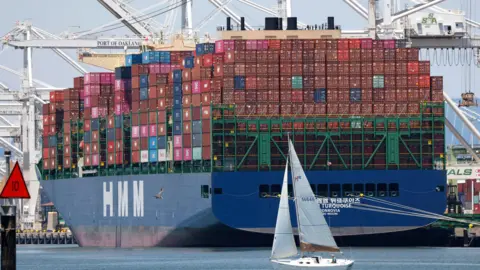**Title: Carney Expresses Disappointment Over Trump’s Increased Tariffs on Canada to 35%**
In a recent announcement that has sparked significant concern, Canadian Prime Minister Mark Carney expressed his disappointment regarding the U.S. government’s decision to raise tariffs on certain Canadian exports to 35%. The new tariff regime, initiated by U.S. President Donald Trump, marks an escalation in the ongoing trade tensions between the two countries. The lift in tariffs, from the previous rate of 25% to the current rate, has been attributed to claims by Trump that Canada has not sufficiently collaborated in addressing the ongoing issues surrounding the trafficking of fentanyl and other illicit drugs into the United States.
In response to the tariff increase, Carney emphasized that Canada is actively working to combat drug trafficking and has implemented significant measures, including investments in enhanced law enforcement resources aimed at dismantling drug gangs. The escalating tariffs come at a time of heightened scrutiny on the impact of international trade policies on domestic economies.
Despite the concerning nature of the increased tariffs, most goods imported from Canada are expected to escape the new taxes, thanks to the existing trade umbrella provided by the United States-Mexico-Canada Agreement (USMCA), which shelters a significant portion of trade from tariffs. The USMCA, which replaced the North American Free Trade Agreement (NAFTA), reflects ongoing efforts to balance trade relations while fostering cooperation across North America.
In conjunction with the increased tariffs on Canada, President Trump has also unveiled a series of additional tariffs targeted at numerous other nations, as part of his broader initiative to reshape global trade dynamics. This broader action raises alarms among economists and financial analysts who caution that such measures could lead to increased costs for American consumers while straining the U.S. economy. However, this sentiment has been publicly downplayed by the Trump administration, with White House Press Secretary Karoline Leavitt asserting that the president continues to “defy” economic predictions by strengthening the economy.
Most countries impacted by the latest round of tariffs have been given a reprieve of seven days before the new rates take effect. Furthermore, shipments that are already in transit or loading for shipment before specified deadlines are exempt from the new tariffs, providing some relief to ongoing trade activities.
The tariff hike has especially raised eyebrows not only in Canada but across the globe, as even smaller economies like Vanuatu and Papua New Guinea are subjected to tariffs of 15%. The emphasis on reciprocal tariffs has prompted discussions around the potential for increased price burdens on consumers and businesses alike due to the cascading effects of these tariffs.
Importantly, although Canada faces a steep tariff rate, the reality is that approximately 90% of its exported goods to the United States fall within tariff-exempt categories under the USMCA, including essential imports like fresh produce and energy exports. However, sectors such as dairy, wood, and leather may still be affected as negotiations continue to unfold.
Carney’s disappointment is compounded by geopolitical intricacies, as he noted that Canada includes only a minute percentage of fentanyl shipments entering the U.S. Nonetheless, the retaliation may have more to do with political dynamics than trade alone. Canada’s consideration of recognizing a Palestinian state has been met with staunch resistance from Trump, who warned such a decision would complicate trade relations significantly.
Former Canadian International Trade Minister Mary Ng conveyed that Canada intends to broaden its trading horizons beyond the American market, highlighting the importance of international partnerships as a strategy to mitigate undue reliance on U.S. trade.
Moreover, the impact of tariff policies has reverberated across Asia as countries such as India and Taiwan have faced significant increases. Despite the challenges, Taiwan’s officials expressed optimism about reaching a favorable agreement with the U.S. that could alleviate some of the pressures caused by the previously mandated tariffs.
In conclusion, as trade tensions intensify between Canada and the United States, the ramifications of increased tariffs could reverberate throughout the global economy, compelling nations to reassess their trade strategies while fostering resilience against such economic maneuvers. The overall landscape remains uncertain, with ongoing negotiations and developments poised to influence not only bilateral trade but also the broader international trading ecosystem.












